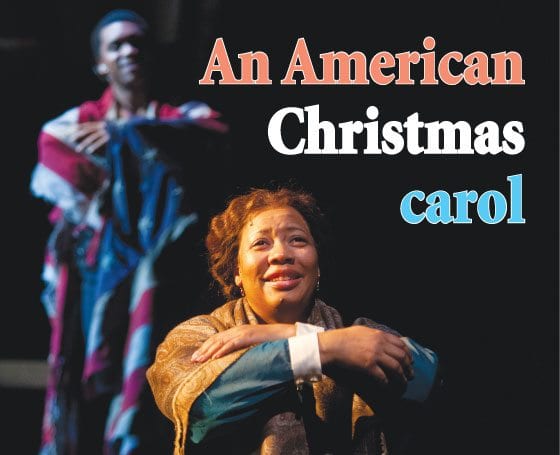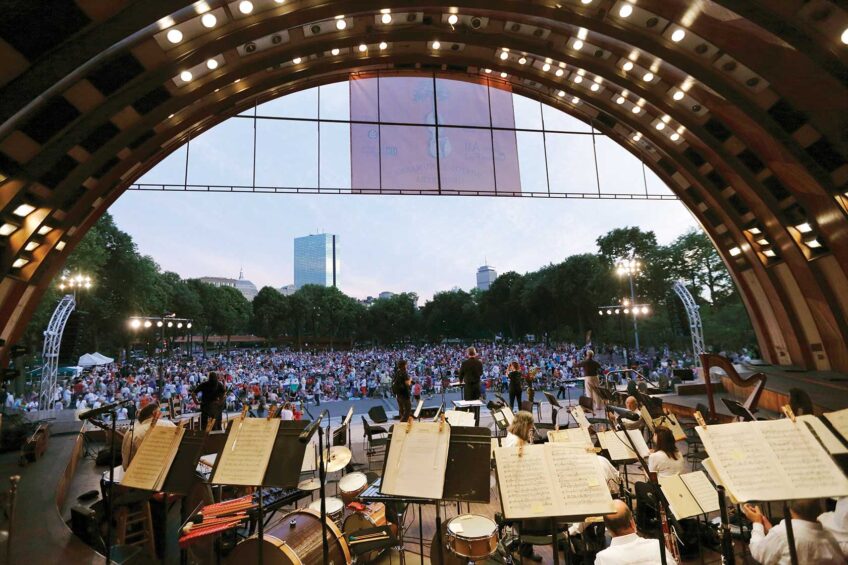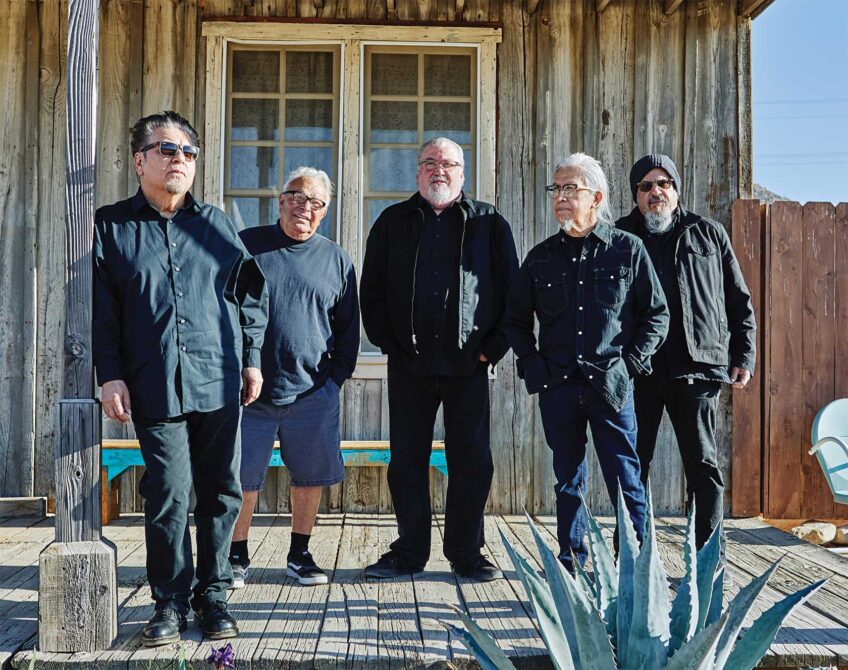

Author: Huntington TheaterDelance Minefee (George’s Ghost) and Jacqui Parker (Elizabeth Keckely) in the Huntington Theatre Company’s production of Paula Vogel’s A Civil War Christmas: An American Musical Celebration
The Civil War and Christmas are laden with musical and story-telling traditions. Pulitzer Prize-winning playwright Paula Vogel has woven the two into a distinctly American holiday pageant, “A Civil War Christmas: An American Musical Celebration.”
Directed by Jessica Thebus, the Huntington Theatre Company production of “A Civil War Christmas” is a richly textured holiday spectacular.
The pageant unfolds in and around Washington, D.C. on a frigid December 25th, 1864.
Four years into the Civil War, with victory in sight, the Union has just re-elected Abraham Lincoln as president.
Set in the heart of a sundered nation, Vogel’s pageant celebrates friendship, love and community in a time of death, destruction and loss. The production connects the journey of the Magi with other quests guided by hope, including the flight of slaves to freedom via the Underground Railroad.
Twelve actors play 47 characters, from celebrated historic figures such as Abraham Lincoln (Ken Cheeseman), Ulysses S. Grant (Stephen Russell), and Robert E. Lee (Ed Hoopman) to lesser known individuals and fictional roles. The actors are also the production’s narrators, and some sing or strum fiddles, banjos and guitars.
Arranged and orchestrated by Daryl Waters and directed by Andrew Resnick, the infectious music weaves diverse cultural threads in a stirring selection of spirituals, carols, marches and hymns.
What keeps this cornucopia of characters and stories moving with coherence and energy are the outstanding performances of the actors and musicians; the parallels among the various plots and their common themes of loss, love and hope; and scenes of sheer stage poetry that unite music, spectacle and speech to captivating effect.
Karen MacDonald gives a self-effacing rendering of the anguished Mary Todd Lincoln and Jacqui Parker is warmly regal as Elizabeth Keckley (1818 –1907), Mrs. Lincoln’s modiste and confidante. A former slave turned dressmaker, she bought freedom for herself and her son George (DeLance Minefee), a Union volunteer who died in his first battle.
Mrs. Keckley is “our first lady”, says her friend Walker Lewis (Jason Bowen), a personal aide to the president who is, like her, an esteemed figure in the capitol’s African American community.
Uzo Aduba is Hannah, who is escaping slavery with her young daughter Jessa. Hyacinth Tauriac brings to the role (alternately performed by Alanna T. Logan) the same gravity and directness that made her so luminous as Raynell in the Huntington’s recent production of “Fences.”
An expansive celebration of community, “Civil War Christmas” incorporates many local elements, including scenes of poet Henry Wadsworth Longfellow at his Cambridge home and references to “The Providence Journal” and Brown University, where Vogel taught writing for almost two decades.
Students from five area colleges and an 11-member children’s ensemble participate in the production’s supporting cast. More than 30 local choral groups take turns caroling before each performance. These ensembles include the Archdiocese of Boston Black Catholic Choir, the Boston Children’s Chorus, and Stambandet, a Scandinavian ensemble.
The spare scenic design by Dan Ostling exposes the stage’s brick walls and the ceiling’s lighting grid, which resembles a field of stars. The sensitive lighting by T.J. Gerckens conjures characters in a variety of scenes—wandering abandoned city streets, crossing paths alongside the frozen Potomac, or partying inside the White House.
The sole stage décor consists of a chandelier, a frayed Union flag, three bare trees, and a wooden scaffold. In some scenes, it resembles the platform of a slave auction. In others, characters who are dead or absent stand on the platform as their loved ones remember them.
Apparitions also emerge in the theatre’s wreath-draped balconies, where candles flicker to evoke the constellations that guide fugitive slaves north. As the Lincolns remember their son Willie, who died as a child, a small boy appears on a balcony in a Union jacket and silently moves his arms and hands as if tapping a drum. The familiar holiday figure of a toy soldier evokes the countless sons lost to war. The balcony also eerily resembles the presidential box of Ford’s Theatre, the scene of Lincoln’s assassination four months later.
Miranda Hoffman’s costumes have an eloquence of their own, from the beige homespun dresses of Hannah and Jessa to the sumptuous hoop skirts worn by Mrs. Keckley and Mrs. Lincoln that affirm the equality of the two women.
Vogel is renowned for plays that explore the darker side of families and relationships. With “Civil War Christmas,” she told an interviewer, “I wanted to write a play that the children in my family could come and see.”
Light comic touches abound, but a few scenes strain for humor. The interaction between a stable boy, Raz, (Molly Schreiber) and his horse, Silver (Ken Cheeseman) lasts too long. An uneasy tinge of humor seeps into scenes of John Wilkes Booth (Ed Hoopman) and his co-conspirators as they bungle their kidnapping plot.
The richness of “Civil War Christmas” is the economy and lyricism with which it weaves visual, musical and dramatic threads to convey the heroism of ordinary people and the humanity of heroic figures in a time of tragedy.
The majestic Gilbert Glenn Brown plays Decatur Bronson, a sergeant of a black regiment sworn to avenge the abduction of his free-born wife, Rose, by Confederate soldiers and the slaughter of surrendered black Union soldiers (the Fort Pillow Massacre, April 12, 1864, Henning, Tennessee).
He tells a new recruit, a young Quaker from Rhode Island (Chris Bannow) how Rose taught him to read and write, and, imagining her, he begins a slow, deep rendition of “Yellow Rose of Texas.” A female chorus joins in. Wearing hoop skirts and bearing bouquets of roses, they cross the stage in a procession followed by Rose (Uzo Aduba). She and Decatur briefly unite in a dance.
In another memorable scene, a veiled Mrs. Lincoln visits an army hospital and sings “Silent Night” to a dying soldier. The character, Moses Levy (DeLance Minefee), is based on Benjamin B. Levy, a Jewish volunteer who received the Medal of Honor. Moses tells her that although he is Jewish, he likes the song and asks her to keep singing. As Mrs. Lincoln softly resumes the carol, six soldiers rise from their cots, blankets folded over their shoulders like prayer shawls, and chant the Kaddish, the Jewish prayer of mourning.
Shortly before last year’s world premier of “Civil War Christmas” at Long Wharf Theatre in New Haven, Vogel wrote, “Where are the American ‘Christmas Carols’?” Look no further than the Boston University Theatre for a magnificently American holiday pageant.






